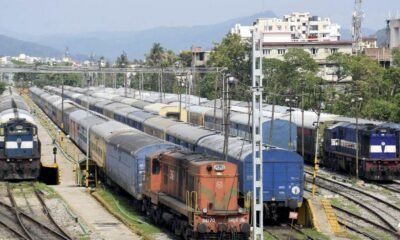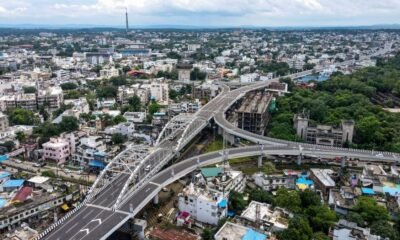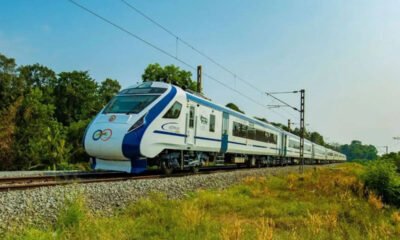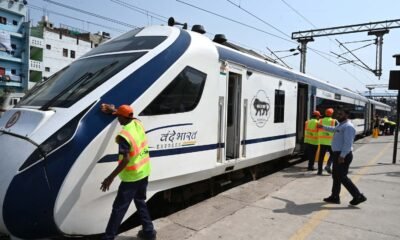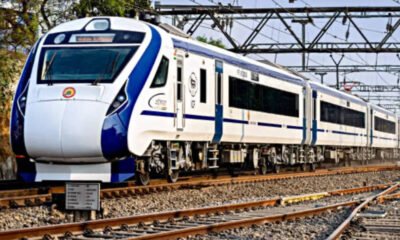Travel Guides & Articles
Bullet train on Mumbai-Ahmedabad to cut travel time to just 2 hrs soon: Vaishnaw | Latest News India
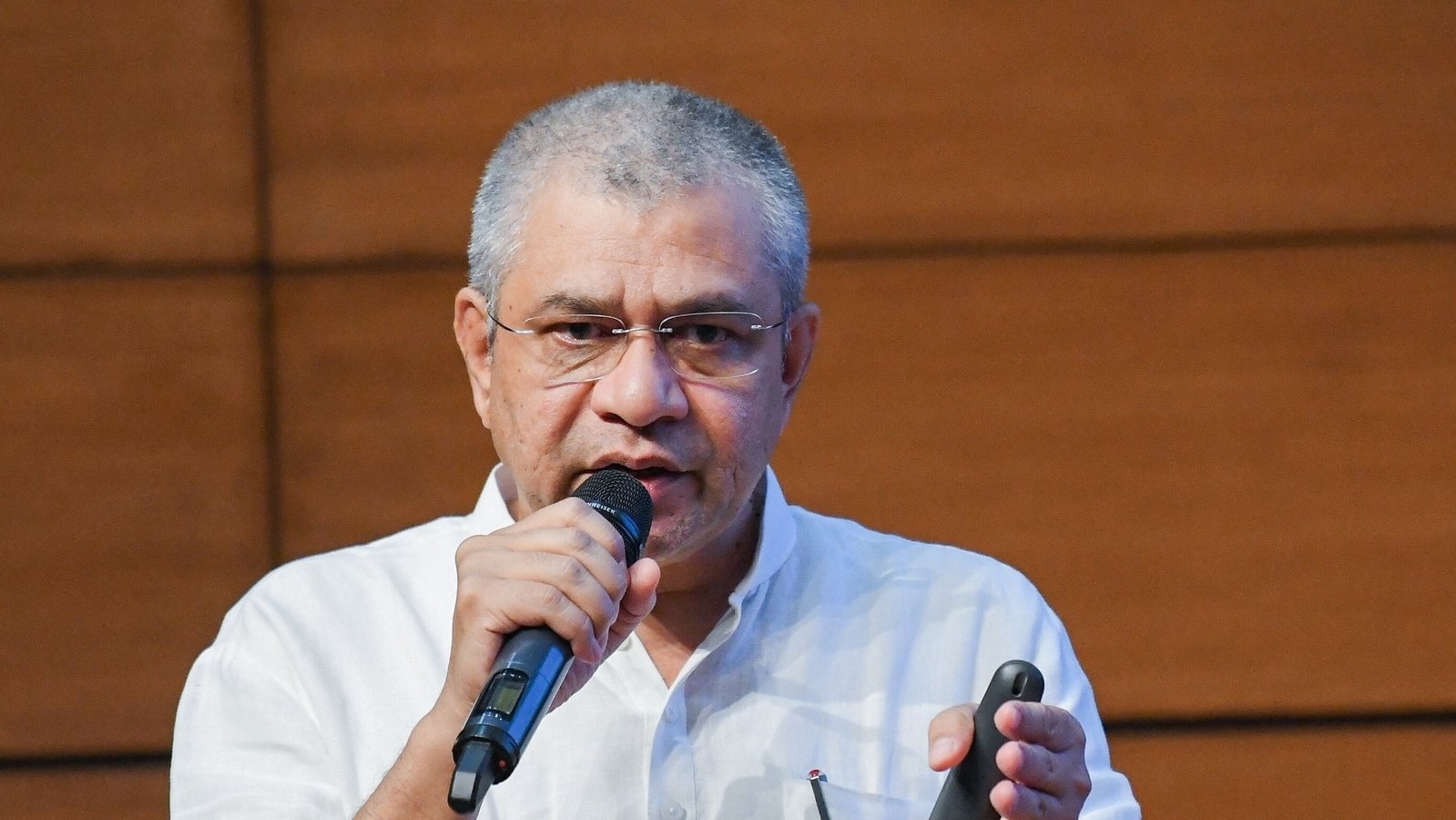
Railway minister Ashwini Vaishnaw on Sunday said India’s first bullet train service will begin soon, reducing the travel time between Mumbai and Ahmedabad to two hours and seven minutes.
He made the statement at Bhavnagar terminus, where he virtually flagged off the Ayodhya Express, Rewa-Pune Express, and Jabalpur-Raipur Express trains. Madhya Pradesh chief minister Mohan Yadav and Chhattisgarh chief minister Vishnu Deo Sai also joined the event.
“The first bullet train from Mumbai to Ahmedabad will start very soon, and the work on the project is going on at a fast pace. When it starts running, the journey from Mumbai to Ahmedabad will take only two hours and seven minutes,” PTI news agency quoted Vaishnaw.
Also Read: India to debut next-gen E10 Shinkansen trains alongside Japan in bullet train project
The train will cover a distance of 508 km
The train will cover a distance of 508 km, starting from the Bandra Kurla Complex in Mumbai and connecting to Vapi, Surat, Anand, Vadodara, and Ahmedabad in Gujarat. It will run at a top speed of 320 kmph.
Vaishnaw also outlined upcoming railway projects in Gujarat, including a new train service between Porbandar and Rajkot, a Rs135 crore coach maintenance facility at Ranavav station, a railway flyover in Porbandar city, two Gati Shakti cargo terminals, and a container terminal at a new port in Bhavnagar.
He said several projects were also moving forward in Madhya Pradesh and Chhattisgarh, with the governments in both states helping fast-track the work.
Vaishnaw said that in the last 11 years of the Narendra Modi government, 34,000 km of new railway tracks had been added, with nearly 12 km being laid every day.
He added that 1,300 railway stations across the country are currently being redeveloped.
“No one has undertaken such a big work to date. When railway stations are renovated in developed countries, they are done systematically by closing down all stations and trains,” Vaishnaw said.
“There is a huge population here, and everyone’s expectation is that work should progress, trains should run, and the station should also be redeveloped. Taking all these challenges into account, Modiji has a big vision today regarding the renovation of these stations,” he added.
New trains launched during the Modi government
The minister also spoke about the new trains launched during the Modi government — Vande Bharat Express, Amrit Bharat Express, and Namo Bharat Express.
“Eight Amrit Bharat trains have been launched so far. They have features like Vande Bharat trains, but the fare is low. These trains have been constructed using new-age technology, and you will be surprised to hear the emotions expressed by passengers using these trains,” he said.
Union ministers Mansukh Mandaviya and Nimuben Bambhaniya were also present.
Travel Guides & Articles
Pilgrimage travel sees 19% growth across India: Report – Brand Wagon News

Pilgrimage travel is emerging as one of the fastest-growing segments of India’s tourism industry, with accommodation bookings across 56 destinations rising by 19% in FY 2024-25, according to MakeMyTrip’s Pilgrimage Travel Trends 2024-25 report.
The study highlights that spiritual journeys are no longer limited to traditional centres alone. While Varanasi, Ayodhya, Puri, Amritsar, and Tirupati continue to see strong demand, newer destinations such as Khatushyam Ji in Rajasthan, Omkareshwar in Madhya Pradesh, and Thiruchendur in Tamil Nadu are also witnessing double-digit growth. In fact, 34 destinations recorded double-digit growth, and 15 saw bookings rise by more than 25%, pointing to broad-based momentum.
Short, purpose-driven travel dominates
The report notes that more than half (53%) of all pilgrimage travellers opted for single-night visits, compared to 45% in leisure travel. Two-night stays accounted for 31%, while longer stays of four nights or more made up less than 5% of bookings. “Pilgrimage travel has always been part of our culture, but what we see now is its scale and consistency across the country,” said Rajesh Magow, Co-Founder and Group CEO, MakeMyTrip.
Interestingly, nearly two in three pilgrimage bookings were made within six days of departure, underlining the last-minute booking behaviour typical of Indian travellers.
Premium stays and group travel on the rise
While budget rooms priced under Rs 4,500 accounted for the bulk of bookings, demand for premium accommodation is rising sharply. Bookings in the Rs 7,000–10,000 range grew by 24%, while those above Rs 10,000 were up 23%. At the same time, group travel has a stronger presence in pilgrimage, making up 47% of trips compared to 38.9% in leisure destinations.
The surge in demand has spurred a wave of new hotels, homestays, and apartments, with more than a third of accommodation supply in pilgrimage destinations added in the past three years. Premium supply has also grown rapidly, with 63% of available upscale rooms launched during this period.
Travel Guides & Articles
Booking.com Reveals How Millennials and Gen Z are Reshaping India’s Travel Landscape

INDIA, 10th September 2025: Travel today is no longer just about reaching a destination. It’s about creating shared memories, strengthening bonds and investing in experiences that truly matter. With Indian travellers increasingly prioritising meaningful moments, mindful indulgence and shared adventures, one of the world’s leading online travel platforms, Booking.com reveals insights into the evolving psyche of Millennial and Gen Z travellers, who are seeking deeper connections and mindful indulgence more than ever before.
“Today’s Indian traveller is driven by a desire for meaningful connection. This is a behavioural shift that’s redefining what a journey is, whether it’s for the 68% of Gen Z planning solo trips to recharge or the 92% of Gen Z parents covering vacation costs for their families. They are balancing the thrill of discovery with the comfort of companionship. Travel is more than just about reaching a destination; it’s about investing in memories with your loved ones, something that is reflected across all generations. Booking.com is committed to empowering every traveller to find their perfect, personalised journey.” said Santosh Kumar, Regional Manager, South Asia at Booking.com.
Family, Friends & Beyond: The New Travel Companions
Indian travellers are reshaping the way they journey together, with millennials strengthening family bonds and Gen Z widening the circle to include parents, partners and friends.
Family first: 62% of Indian millennials prefer travelling with their immediate family (spouse/children), higher than the APAC average of 53%.
Paying it forward: A majority of travellers are willing to cover trip costs for their loved ones. 89% of millennials and 88% of Gen Z are willing to pay for a partner’s, parent’s trip or their children’ trip.
Friendship journeys: The circle is widening with 83% of Gen Z are willing to pay for friends’ holidays, compared to 75% of millennials and 58% of Gen X.
Responsible travellers: 92% of Gen Z parents have paid for vacations (fully/partly) for their family, ahead of millennials (84%), Gen X (71%) and Baby Boomers (66%).
These insights highlight how modern travel is deeply rooted in connection, care and shared experiences
Smart Splurges: Balancing Indulgence with Mindfulness
While Indian travellers across generations are showing a rising appetite for travel spend compared to their APAC counterparts – yet they remain sharply mindful of value and budgeting.
Spending surge: 42% of millennials and 89% of Gen Z in India plan to spend more on travel this year, above the 24% APAC average.
Gen X steps up: 35% of Indian Gen X expect to increase travel spend—more than double the 15% APAC average.
Splurge for memories: 65% of millennials and 57% of Gen Z admit they’d “lavishly blow their budget” for a truly unforgettable holiday.
Mindful choices: 82% of Gen Z and 88% of millennials say travel is a priority, but they are careful to find the best options within their budget.
Pocket-sized adventures: Both millennials (77%) and Gen Z (70%) believe taking multiple short trips is a smarter use of budget than one long holiday, reflecting a desire for more frequent getaways.
Curiosity Meets Comfort: Adventure with Assurance
Indian travellers are blending the desire for adventure with the need for safety and familiarity—seeking experiences that balance wellness, culture, and safety.
Solo escapes: 68% of Gen Z and 65% of millennials plan solo trips to relax and recharge.
Motivations differ: Gen Z are motivated by adventure (46%) and food (45%), while millennials lead towards cuisine (50%), cultural immersion (48%) and adventure (48%).
Safety first: A top priority for both millennials (72%) and Gen Z (66%) when choosing a destination, followed by value for money (millennials 66%, Gen Z 61%) and good weather (millennials 64%, Gen Z 61%).
Familiar comfort: The appeal of a trusted destination is strong, with nearly 70% of both generations planning to revisit a place they already know.
Indians across generations are making travel a mindful priority, seeking value through multiple shorter escapes and unforgettable experiences. Balancing new adventures with the reassurance of safety, culture and familiarity, they see journeys not just as trips but as investments in connection and meaningful discovery.
Travel Guides & Articles
Nepal Gen Z protests lead to travel chaos, Bengal’s Durga Puja takes heavy hit

The wave of student and youth protests in Nepal has snowballed into a major crisis, crippling normal life in Kathmandu and spilling across the border to India’s tourism sector.
The agitation began as a campaign against corruption but escalated sharply after the government imposed a social media ban, triggering violent clashes in the capital.
Police opened fire on demonstrators, leaving at least 19 dead, which further fuelled public anger. Under mounting pressure, the Nepalese government was forced to lift the ban and issue a late-night statement appealing for calm.
The unrest has cast a shadow over India’s Durga Puja holiday season, particularly in West Bengal, where Nepal is a popular tourist destination. Travel operators reported mass cancellations within hours of the violence breaking out.
“Over a hundred bookings were cancelled as soon as news of the unrest spread,” said Samrat Sanyal, General Secretary of the Himalayan Hospitality and Tourism Development Network (HHTDN). He added that cross-border traders, too, face mounting financial losses.
At border checkposts, drivers waiting for passengers have been left stranded after the Sashastra Seema Bal (SSB) issued a high alert, halting all vehicle crossings. Some locals have even expressed intent to join the protests, with one resident declaring, “The Gorkhas are not afraid.”
For many holidaymakers, the situation has thrown plans into disarray. Suman Ghosh, a banker from Kolkata, said he had already booked air tickets and hotels for his family but was now considering cancelling the trip.
“The prevailing situation is not safe for my family. I don’t know whether I will get my refund. My travel agent hasn’t responded,” he said.
Industry voices warn of deep losses during what is usually a peak travel period. Anil Punjabi, a member of the National Committee of the Travel Agents Federation of India, called the developments “disastrous for the tourism industry”, noting that tourism is “the first to be hit and the last to cure”.
He said Bengal typically sends 12,000 to 15,000 tourists to Nepal every Puja season, each spending around Rs 30,000 to Rs 35,000, but this year most are now seeking refunds or scrambling for alternatives.
The mood across the travel sector remains bleak, with operators ruling out recovery during the festive season. West Bengal Chief Minister Mamata Banerjee has voiced concern over the turmoil in Nepal and its impact on border districts, while stating that the Centre has yet to reach out to her government.
She urged residents to maintain peace along the border as uncertainty lingers over the neighbouring country.
– Ends
-

 Business2 weeks ago
Business2 weeks agoThe Guardian view on Trump and the Fed: independence is no substitute for accountability | Editorial
-
Tools & Platforms4 weeks ago
Building Trust in Military AI Starts with Opening the Black Box – War on the Rocks
-

 Ethics & Policy1 month ago
Ethics & Policy1 month agoSDAIA Supports Saudi Arabia’s Leadership in Shaping Global AI Ethics, Policy, and Research – وكالة الأنباء السعودية
-

 Events & Conferences4 months ago
Events & Conferences4 months agoJourney to 1000 models: Scaling Instagram’s recommendation system
-

 Jobs & Careers2 months ago
Jobs & Careers2 months agoMumbai-based Perplexity Alternative Has 60k+ Users Without Funding
-

 Education2 months ago
Education2 months agoVEX Robotics launches AI-powered classroom robotics system
-

 Podcasts & Talks2 months ago
Podcasts & Talks2 months agoHappy 4th of July! 🎆 Made with Veo 3 in Gemini
-

 Education2 months ago
Education2 months agoMacron says UK and France have duty to tackle illegal migration ‘with humanity, solidarity and firmness’ – UK politics live | Politics
-

 Funding & Business2 months ago
Funding & Business2 months agoKayak and Expedia race to build AI travel agents that turn social posts into itineraries
-

 Podcasts & Talks2 months ago
Podcasts & Talks2 months agoOpenAI 🤝 @teamganassi


